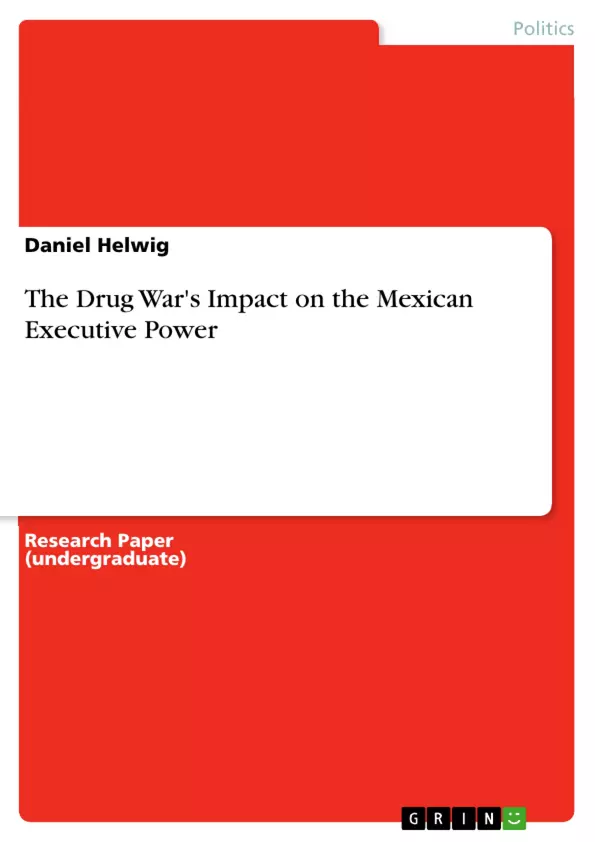Since president Felipe Calderón started his policy of “mano dura” against the drug cartels in 2006, Mexico has seen unprecedented internal violence – with the total number of casualties having exceeded 45.000 in 2011.
Assuming that the Mexican conflict is a war, subsequent questions can be asked with respect to a classic of political theory. Alexis de Tocqueville observed the natural tendency of central governments to reach out for more power in times of war. He further specified this statement by claiming that particularly the executive branch gains power in such situations. A democratic nation would be subject to this behavior, because it perceives the central executive as “the only power which appears to be intrinsically sufficiently strong, enlightened, and secure, to protect [it] from anarchy.”
Here, the Mexican case provides the analyst with further particularities. Not only follows the country’s executive the logic of presidential system, but also is it still on the democratic recovery from a long-term authoritarian one-party-rule. This paper briefly examines the drug war’s impact on the Mexican constitutional reality and thus aims at answering the question: What effect does the conflict have on the power endowment of the Mexican executive?
In order to validate the hypothesis, that the president’s power is gradually strengthened, the author chose a rather linear approach. After first introducing key data about the Mexican drug war, the institutional legacies of more than 70 years of one-party-rule are discussed. With the president’s power having been on decline since a process of democratization gathered pace in 2000, various aspects of today’s situation are understandable only by scrutinizing the consequences of previous “arrangements” between the ruling party and the drug traffickers. The paper’s third part is dedicated to examining the executive’s endeavors to extend its powers via the use of federal forces out of their original jurisdiction as well as via the creation of states of emergency without legal basis – both with dire consequences for the constitutional order of the Mexican state. Finally, the findings are summarized and the conclusion is drawn that the militarized law enforcement notably has power-shifting effects on the Mexican decision-makers and may complicate the further consolidation of the nation’s democracy.
Inhaltsverzeichnis (Table of Contents)
- I. Introduction
- II. The Drug War
- III. Institutional Legacies and Presidential Power
- IV. (In-)Formal Extension of Executive Power
- V. Conclusion
Zielsetzung und Themenschwerpunkte (Objectives and Key Themes)
This paper examines the impact of the Drug War on the power of the Mexican executive. It aims to understand how the conflict has affected the president's authority and the constitutional order of the Mexican state. The analysis focuses on the historical legacy of one-party-rule and its influence on the executive branch, as well as the current situation and the president's efforts to extend his powers through the use of federal forces and the creation of emergency states.
- The Drug War in Mexico and its impact on the country's security situation
- The role of the Mexican executive in the Drug War
- The influence of the PRI's legacy on the current political landscape
- The formal and informal extension of presidential power in the context of the Drug War
- The implications of the Drug War for the consolidation of democracy in Mexico
Zusammenfassung der Kapitel (Chapter Summaries)
- I. Introduction: The chapter introduces the Drug War in Mexico and its context, highlighting the violence and the increasing use of military force. It also presents Alexis de Tocqueville's observation about the tendency of central governments to gain power in times of war and how this applies to the Mexican case.
- II. The Drug War: This chapter delves into the complexities of the Drug War, emphasizing its multi-layered nature and the various actors involved, including drug cartels and the Mexican state. It also examines the historical context of the war, tracing its roots back to the 19th century and the role of the PRI in maintaining a web of clientelism between politicians and drug traffickers.
- III. Institutional Legacies and Presidential Power: This chapter explores the legacy of one-party-rule under the PRI and its impact on the presidential power structure. It analyzes the cooperation between the president, the PRI, and the drug economy, and how this system of selective law enforcement contributed to the current security situation.
Schlüsselwörter (Keywords)
The key terms and concepts explored in this paper include: Mexican Drug War, executive power, presidential power, institutional legacies, one-party-rule, PRI, cartel violence, security threats, democratization, human rights abuses, and the consolidation of democracy.
Frequently Asked Questions
How has the Drug War affected the power of the Mexican President?
The conflict has led to a gradual strengthening of executive power. As noted by Tocqueville, central governments tend to reach out for more authority during times of war to prevent anarchy.
What role did the PRI's legacy play in the current conflict?
The PRI's 70-year one-party rule established "arrangements" between the state and traffickers. The decline of this system during democratization contributed to the current instability and violence.
What is the "mano dura" policy?
It refers to the "iron fist" strategy initiated by President Felipe Calderón in 2006, involving the massive deployment of federal and military forces against drug cartels.
How does the executive extend its power informally?
The executive has used federal forces outside their original jurisdiction and created "states of emergency" without a clear legal basis, shifting the constitutional balance of power.
What are the implications for Mexican democracy?
The militarization of law enforcement and the shift in decision-making power may complicate the further consolidation of democracy and lead to human rights challenges.
- Quote paper
- Daniel Helwig (Author), 2012, The Drug War's Impact on the Mexican Executive Power, Munich, GRIN Verlag, https://www.grin.com/document/187289



